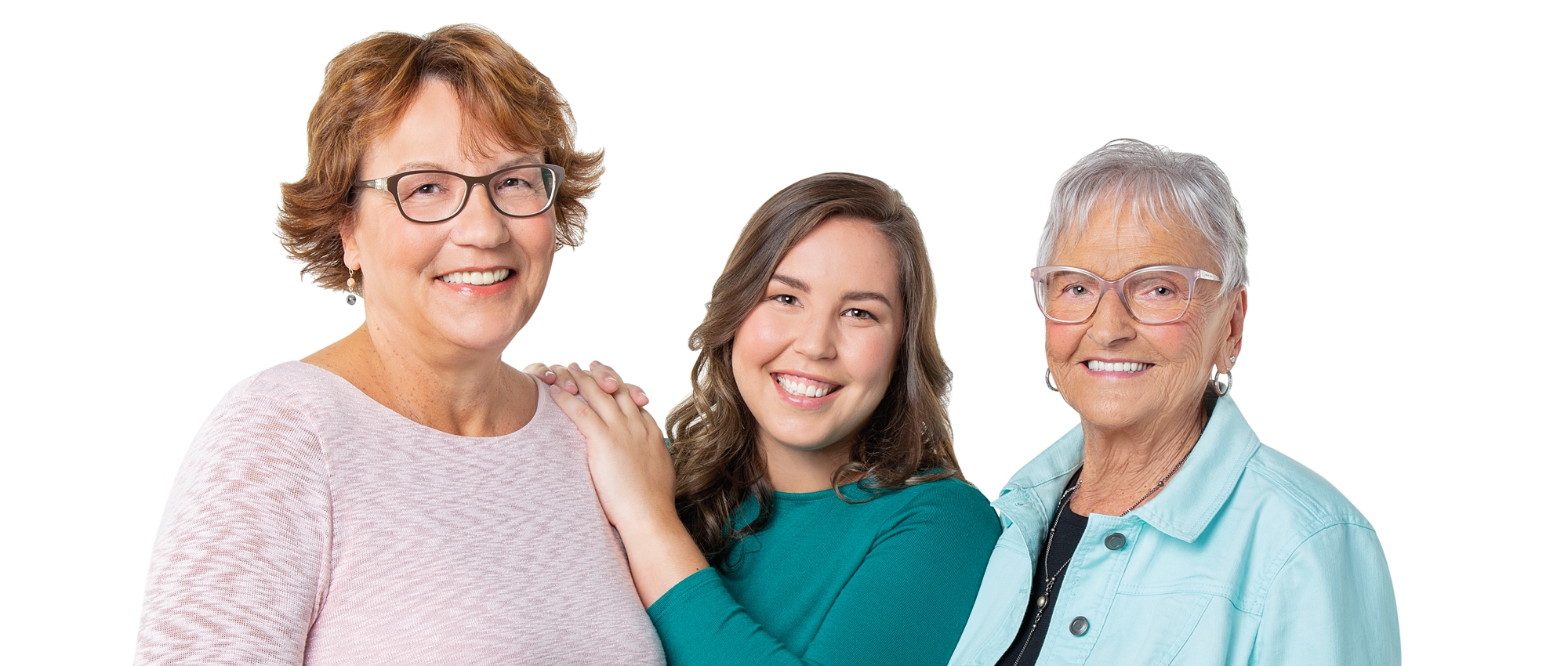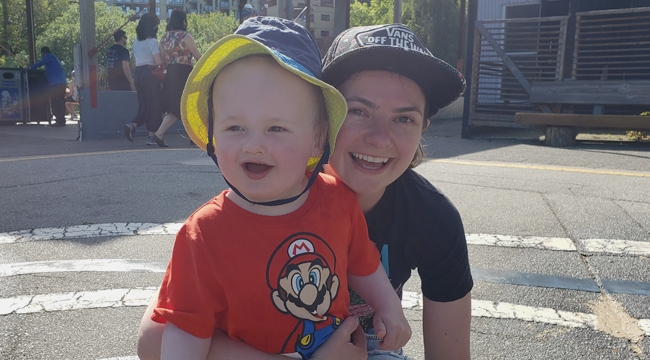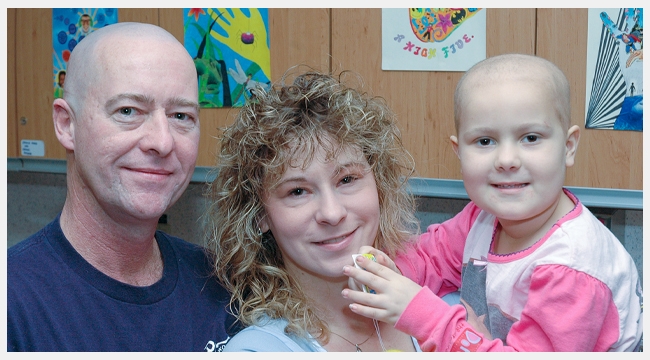Mother, daughter and granddaughter give new meaning to the term "blood relatives"
Three generations of women share a special connection to each other — and to Canada’s Lifeline
From left to right: Brenda, blood donor; Julia, employee and financial donor; Vicki, blood recipient and former blood donor. (Photo taken pre COVID 19)
The year was 1958 and 19-year-old Vicki Mills had just started her first job at a small, local business in her home province of Saskatchewan.
Eager to help support her new colleagues in any way she could, when she learned that her employer at the time was dealing with a chronic health issue and needed regular blood transfusions, Vicki quickly rallied together a few of her co-workers to donate blood.
“I remember feeling so good about that first donation that I kept going back as often as I could,” she said. “I knew that even if I wasn’t helping [my boss] directly, if I could even just help one person, that would be an incredible thing.”
This was Vicki’s first interaction with Canada’s blood supply system, but it would be far from her last.
Those lunch-time blood donations would serve as a catalyst for a lifetime of connections with Canada’s Lifeline for her and her family.
From donor to recipient — and back again
Vicki continued to donate blood semi-regularly throughout her early 20s, until she suffered a miscarriage and needed her own blood transfusion.
Although she had already been an occasional donor for several years, Vicki said that being on the receiving end of a transfusion is what solidified her commitment and passion for blood donation and helped her better understand the impact of her previous support.
“After my blood transfusion, I remember thinking, ’wow, donating blood is even more important than I realized’. What if the blood I needed hadn’t been there for me when I needed it?”
It was after that experience that Vicki promised herself she would donate blood whenever she was able. She also registered her consent to donate her organs and tissues.
True to her word, Vicki donated regularly from the late 1960s, up until 2007, when she underwent open-heart surgery. Once again, she went from donor to recipient, receiving blood transfusions to help her recover from the procedure.
Unfortunately, unlike the first time she received transfusions, her heart surgery marked the end of her decades-long blood donation journey, as her doctor prescribed her a medication that sadly rendered her ineligible to donate blood.
ABCs of eligibility to donate blood
Though Vicki was disappointed she would no longer be able to safety donate blood herself, she was thrilled when her daughter, Brenda, chose to pick up the blood donation baton and carry on her work.
Support for Canada’s Lifeline gets passed down through generations
Like her mother, Brenda Deacon was inspired to start donating blood because of a personal connection — several personal connections, in fact.
Just a few years after her mother’s heart surgery and blood transfusions, Brenda’s stepsister passed away from stomach cancer in August 2011. Then, just days later, Vicki suffered a stroke.
Growing up, Brenda’s parents were both regular blood donors. She had been meaning to donate blood for years, but “just never got around to it — no excuses,” she said.
With several family health crises occurring in quick succession, however, Brenda took this as an unmistakable sign to finally book her first appointment to donate blood, at 51 years old. She quickly began making up for lost time.
“Once I started [donating], I kept going back as often as I could. It has never failed to amaze me how easy it is to help save lives,” she said. “I just made my 37th donation, so I hope that shows people that it’s really never too late to start!”
When Brenda began donating blood in 2011, her daughter, Julia, also felt inspired to do her part to help patients and join the powerful connection shared by the two most important women in her life.
But, as someone living with type 1 diabetes, Julia discovered that she wasn’t eligible to donate blood at the time. Prior to March 2021, people living with type 1 diabetes were deferred from donating blood and blood components.
“It was definitely disappointing to learn that I couldn’t donate [blood] — I’m really close with my mom, and it was something I wanted to share with her,” she said.
“I also often think about the fact that if [my grandmother] hadn’t received blood during the multiple times she has needed it, I would have missed out on so much time with her. That’s tough for me to wrap my head around, because I can’t even imagine what my world would look like without her.”
That special connection to her mother and grandmother that she was longing for was finally made in 2019, however, when Julia joined Canadian Blood Services as an employee and discovered she could continue her familial legacy of helping patients, through financial giving.
“During my time [working] here, I’ve learned that there are so many more ways to support patients than I ever realized” she said.
“It’s really just all about what best fits your abilities — and I realized that the best fit for me was financial giving.”
Q&A: How financial donors can make a difference for patients
“Becoming a financial donor has given me a way to help connect patients with the lifesaving blood products they need — and it has also made my connection to my mother and grandmother even stronger,” said Julia.
Lifesaving connections come full circle
For the first time in 2019, all three generations of women in Julia’s family were simultaneously connected to Canada’s Lifeline in some way — Julia, as an employee and financial donor, Brenda as a milestone blood donor, and Vicki as a blood recipient and former blood donor.
And when Vicki suffered a bad fall in December 2020 that landed her in the hospital with pelvic fractures — and once again, in need of blood transfusions — the shared connection between these three women felt stronger than ever.
“Seeing my [grandmother] receive blood transfusions this time around, versus 10 years ago, felt different. Now that my mom and I are both donors, we weren’t as scared, because we understood how those transfusions were going to save her life,” said Julia.
“We also felt pretty good knowing that we both play a role in helping to ensure that blood products are always there for her — and patients like her — whenever they’re needed.”
Thanks in part to those blood transfusions, Vicki made a full recovery by March 2021.
Around the same time, Julia also received some exciting news.
New changes to donor eligibility for Canadians living with type 1 diabetes meant that it could soon become possible for her to follow in her mother and grandmother’s footsteps and complement her financial giving by becoming a blood donor.
|
Canadians living with type 1 diabetes now eligible to donate blood Some people living with type 1 diabetes are now eligible to donate blood, thanks to a recent update to donor eligibility requirements by Health Canada. Diabetes Canada, Canadian Blood Services and diabetes advocate Edward Robertson partnered to advocate for the change. Previously, Canada had only allowed those living with type 2 diabetes who manage their disease by diet, non-insulin medications or stable doses of insulin, to donate blood. Those living with type 1 diabetes were previously ineligible. Now people with both type 1 and type 2 diabetes taking insulin will be accepted if they have not experienced an acute diabetic event in the three months preceding blood donation. For more information, read the ABCs of eligibility. |
“It’s something I’ve always wanted to do, as long as it was healthy for me to do so,” said Julia.
Julia said that she is looking forward to the day where she can finally sit side-by-side with her mother in their local donor centre and make her first blood donation. Of course, she added, her grandmother will be on speed dial so that all three women can experience that special milestone together.
“I’m proud of what I was able to do when I could donate blood — and I’m also proud to be a recipient,” said Vicki. “Now, I’m just so proud of Brenda and Julia for carrying on what I can’t do anymore.”
This Mother’s Day, help save a life in honour of a special woman in your life – by giving in whichever way you choose. Make a financial donation, book an appointment to donate blood, join our stem cell registry or make a commitment to be an organ or tissue donor. No matter how you choose to give, your generosity will have an important impact for patients across Canada.



